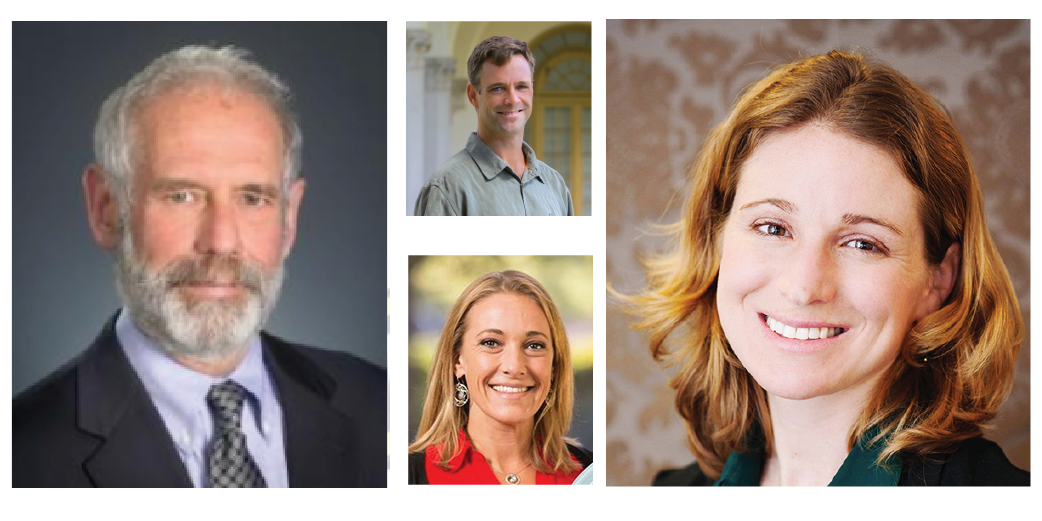
by HEC Team | Feb 14, 2019 | 2019, News
The bankruptcy of Pacific Gas and Electric (PG&E) in the aftermath of the devastating wildfires in California is changing long held beliefs in the utility sector. Taking action on this and other challenges demand vision and leadership. The Hawaii Energy Conference, March 27 & 28 on Maui, will host energy leaders who are responding to these challenges and will explore how other states with ambitious renewable energy targets like Colorado, California, and Hawai’i are adapting.
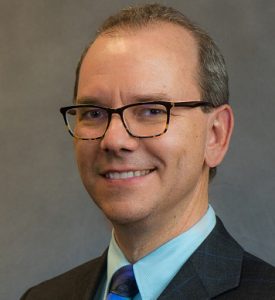
Jeffrey Ackerman, Chairman of Colorado PUC
Those who attend the conference will hear from experienced leaders in energy with a wealth of experience and key positions in government and the private sector. These will include public utility commissioners from throughout the U.S. who are thought leaders on policy, including:
Jeffrey Ackerman, Chair, Colorado Public Utilities Commission, who led the commission’s efforts to “establish requirements for a coordinated electric planning process that is to be conducted on a comprehensive, transparent, statewide basis”, laying the groundwork for rules to include battery storage when supply-side resources are acquired.
Abigail Anthony, Commissioner, Rhode Island, Public Utilities Commission, who is designing and implementing energy solutions that help modernize the state’s grid infrastructure while achieving equity and fairness in the rate structure.
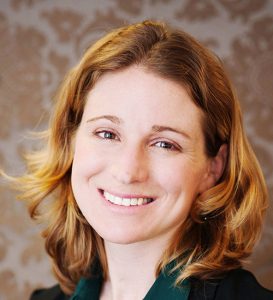
Abigail Anthony, Commissioner of Rhode Island PUC
Jay Griffin, Chair, Hawaii Public Utilities Commission, who was recently elevated to that position after serving as a member of the commission. He now leads Hawaii’s efforts at achieving a 100% RPS by 2045 and the commission’s efforts in clean transportation as a “natural evolution to our clean energy and climate policies.”
Michael Picker, President, California Public Utilities Commission, who is leading California’s charge to implement a 60% Renewable Portfolio Standard (RPS) by 2030 and the mandate that all the state’s electricity come from carbon-free resources by 2045.
Jennifer Potter, Commissioner, Hawaii Public Utilities Commission, who is committed to Hawaii’s ambitious renewable energy goals, bringing to bear her wealth of experience as a senior scientific engineering associate at Lawrence Berkeley National Lab and energy specialist at the Hawaii Natural Energy Institute.
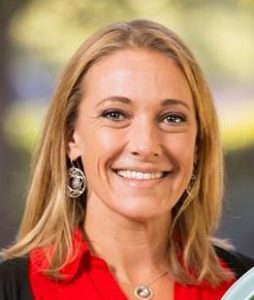
Jennifer Potter, Commissioner, Hawaii PUC
“Anyone involved in thinking about or transforming the energy evolution should attend the Hawaii Energy Conference,” Commissioner Potter asserted. She added, “This includes policymakers, utility practitioners, academics, technology vendors, and third-party energy market players. Hawaii continues to be a leader in DER integration and is positioned to be a leader in utility scale renewable projects in the next five years. We are working on regulatory reform, DR markets, microgrid initiatives, integrated grid planning (T & D & BTM), resilience, and climate change initiatives (across local and state governments). The Hawaii Energy Conference is a place for innovation and collaboration.”
The Hawaii Energy Conference, presented by the Maui Economic Development Board (MEDB) and supported by the County of Maui Office of Economic Development, consistently attracts energy industry leaders from Hawaii, the Mainland, Japan and Europe to exchange ideas on how to better serve customers in today’s rapidly changing energy environment. Held at the Maui Arts and Cultural Center, the conference program features invited Keynote speakers, panel sessions, case studies, exhibits and ample time for networking.
The 2019 Sponsors are: Carbon Lighthouse, Hawaii Natural Energy Institute, Johnson Controls, Ulupono Initiative, Innergex, Hawaii Electric Companies, Hawaii Energy, PXiSE Energy Solutions, Powin Energy, Ameresco, Burns & McDonnell, Eaton, Gridworks, UH Hawaii Energy Policy Forum, Ohm Energy Techologies and Pika Energy.
For information on how to register and other details, visit: www.hawaiienergyconference.com.
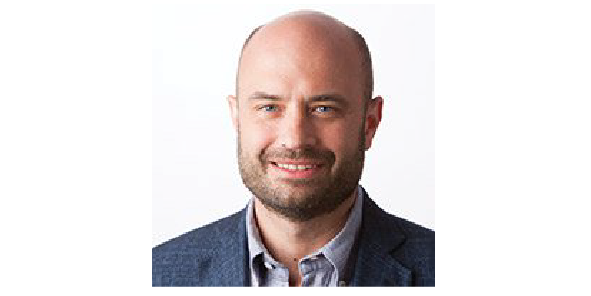
by HEC Team | Feb 4, 2019 | 2019, News
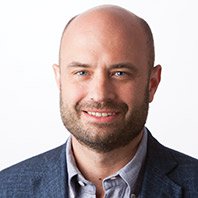
Edward Fenster, Sunrun Co-Founder and Executive Chairman, will address the Hawaii Energy Conference on March 27, 2019.
Asked to name his favorite thing by his preschool teacher Fenster replied without hesitation, “Electricity!” Therefore, it is not surprising that he now steers the largest dedicated residential solar, storage, and energy services company in the U.S., bringing affordable and sustainable solar generated electricity to thousands of homes across the nation.
Sunrun was the brainchild of Fenster and Co-Founder Lynn Jurich. Together they created a company known for innovation in a highly regulated and often uncertain environment.
Fenster brings to the Hawaii Energy Conference his years of experience in design and testing new energy systems, while developing consumer-focused financial structures. The theme for this year’s conference is “Innovation in Practice.” No one comes more qualified to explore this theme than Edward Fenster.
The Hawaii Energy Conference is presented by Maui Economic Development Board, Inc. in collaboration with the Maui County Office of Economic Development. The conference explores national and international trends in energy through the prism of Hawaii’s energy environment. Energy, Business, and Environmental professionals of all stripes from our global community will benefit from the conference’s in-depth conversations with energy industry leaders and the ample networking time provided.
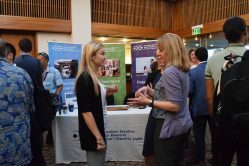
by HEC Team | Nov 27, 2018 | 2019, News
The Maui Energy Conference returns to the Maui Arts Cultural Center March 27-28, 2019 with a new name.
Maui Economic Development Board announced today that the conference would be renamed the Hawaii Energy Conference (HEC) to reflect what it has always been–the premier Energy Conference in Hawaii focused on statewide interests as seen through the prism of national and international developments in energy.
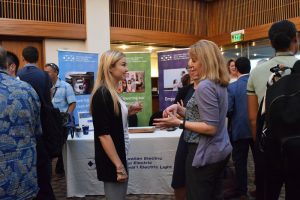
The Hawaii Energy Conference offers ample time for networking and connecting with energy industry leaders.
In its 6th year, the conference is presented by the Maui Economic Development Board (MEDB) and supported by the County Of Maui Office of Economic Development. Hawaii is a living laboratory for the effective integration of renewable energy technology, the transformation of the regulatory environment, and the growth of potential market opportunities.
The HEC consistently attracts energy industry leaders from Hawaii, the Mainland, Japan and Europe to exchange ideas on how to better serve customers in the Islands’ rapidly changing energy environment. Participants can take advantage of the ample networking time and have access to all the business and technical talent attending.
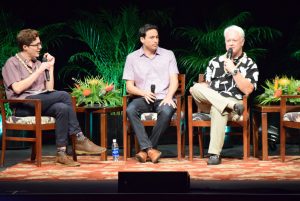
Conference Chair Doug McLeod (right) leads Q & A with 2018 Keynote Speaker Rep. Chris Lee (center) and Gavin Bade, Utility Dive (left).
Douglas McLeod, HEC Program Committee Chair, observes, “The name change reflects the fact that we have evolved into the leading energy conference in the state. The name Hawaii Energy Conference supports our reach to a wider national and international audience, especially to new entities not familiar with Maui and/or the Maui Energy Conference.”
Frank De Rego Jr., Director of Business Development Projects at MEDB and Program Committee Vice-Chair stated, “MEDB has always been a convener of values-based conversations on the most challenging opportunities facing Maui County and the State of Hawaii. For the past six years, MEDB has presented the energy conference as a means to share our mana’o (wisdom) with others while also being receptive to new ideas and best practices from around the world. Taking the name “Hawaii Energy Conference” acknowledges that broader focus and welcome to all comers.”
This year the HEC will include discussions on Distributed Energy Resources (DER) and grid modernization, exploring how a revitalized solar industry can contribute to Hawaii’s clean energy goals.
On the regulatory front, Hawaii was the first state in the nation to institute Performance Based Regulation and other regulatory innovations. The conference will investigate how regulation aligns the interests of the utility and other stakeholders with the goals of public policy.
“We also need to talk about the interplay between Fossil and Renewable energy in the ‘real’ world,” says McLeod. “We can’t ignore the way 2/3 of our energy is used. Most goods and passengers still travel in planes and ships powered by fossil fuels. How do we reach our long term goal using the right blend of resources?”
The HEC will also tackle land use and development with its relationship to energy. Specifically, how can new housing developments be a catalyst for further clean energy gains? How do we bring together government, regulators, developers, energy producers, the utility and the community in a common cause to create a clean energy-housing construction nexus? Is it really such an outrageous idea to think we could build housing in smart connected communities that can limit future electricity demand while providing services to the grid?
“Building from the success of the Maui Energy Conference,” says De Rego. “we hope stakeholders representing the wide variety of interests in energy will join us on Maui in March for the Hawaii Energy Conference.”









